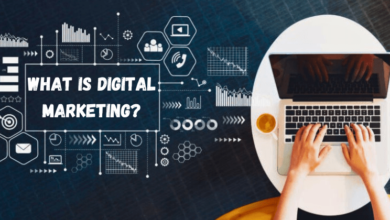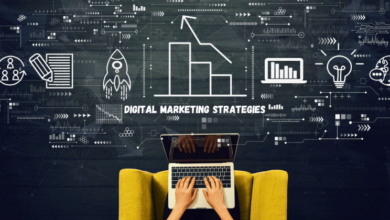Benefits of Digital Marketing: Unlocking the for Your Brand

Benefits of digital marketing: In the rapidly evolving landscape of the business world, the importance of digital marketing cannot be overstated. As technology continues to advance, businesses are presented with unprecedented opportunities to connect with their target audiences. Digital marketing has emerged as a powerful tool that goes beyond traditional advertising, allowing brands to engage with consumers in a more personalized and impactful way. This article explores the myriad benefits of digital marketing and how it can propel your brand to new heights in the digital era.
Enhanced Reach and Visibility:
One of the primary advantages of digital marketing is its ability to amplify the reach and visibility of your brand. Unlike traditional methods that are confined to a local or regional audience, digital marketing enables global outreach. Through channels such as social media, search engines, and email marketing, your brand can connect with potential customers around the world. This expanded reach opens doors to new markets and opportunities, allowing your business to grow beyond geographical constraints.
Targeted Marketing Strategies:
Digital marketing empowers businesses to create highly targeted and personalized marketing strategies. Through data analytics and user behavior tracking, brands can gain valuable insights into the preferences and habits of their audience. This information enables the creation of tailored campaigns that resonate with specific demographic groups. Whether it’s through social media advertising, content marketing, or email campaigns, targeted strategies ensure that your message reaches the right people at the right time.
Cost-Effective Campaigns:
Compared to traditional advertising methods, digital marketing offers a more cost-effective way to promote your brand. Platforms such as Google Ads and social media advertising allow businesses to set budgets, track performance, and optimize campaigns in real-time. This level of control ensures that your marketing budget is utilized efficiently, maximizing the return on investment. Additionally, digital marketing provides a level playing field for businesses of all sizes, enabling startups to compete with established brands on a global scale.
Real-Time Analytics and Measurement:
One of the key advantages of digital marketing is the ability to measure and analyze campaign performance in real time. Through tools like Google Analytics and social media insights, businesses can track website traffic, user engagement, conversion rates, and more. This data-driven approach allows for quick adjustments and optimization of marketing strategies. Unlike traditional methods where results may take weeks or months to analyze, digital marketing provides instant feedback, enabling agile decision-making.
Building Customer Relationships:
Benefits of digital marketing facilitates the building of meaningful and lasting relationships with customers. Social media platforms provide a direct line of communication between brands and consumers, fostering engagement and interaction. Regularly updating content, responding to customer inquiries, and showcasing the human side of your brand through storytelling contribute to a positive brand image. Moreover, email marketing campaigns, personalized content, and loyalty programs help nurture customer loyalty over time.
Diversification of Marketing Channels:
The digital landscape offers a plethora of marketing channels, providing businesses with the opportunity to diversify their strategies. From search engine optimization (SEO) to social media marketing, influencer collaborations, and email campaigns, brands can leverage a mix of channels to reach different audience segments. Diversification not only increases visibility but also helps mitigate risks associated with reliance on a single marketing channel.
Adapting to Consumer Behavior:
As consumer behavior continues to evolve, digital marketing allows brands to stay agile and adapt to changing trends. With the rise of mobile usage, for example, optimizing content for mobile platforms has become imperative. Social media trends, search engine algorithms, and emerging technologies all play a role in shaping consumer preferences. Digital marketing enables brands to stay ahead of the curve and adjust their strategies to align with evolving consumer behavior.
Improved Conversion Rates:
The targeted and personalized nature of digital marketing contributes to higher conversion rates. By tailoring content and offers to specific audience segments, businesses can increase the likelihood of converting leads into customers. Additionally, features such as retargeting ads remind potential customers of products or services they have shown interest in, providing a gentle nudge towards completing a purchase. This precision in targeting leads to more efficient conversion funnels and improved overall sales performance.
Global Branding and Reputation Management:
Digital marketing serves as a powerful tool for global branding and reputation management. Through consistent and strategic online presence, brands can shape how they are perceived by a global audience. Social media monitoring tools allow businesses to track mentions, reviews, and sentiments, enabling proactive reputation management. Engaging with customers on social platforms and addressing concerns in a timely manner contributes to building a positive brand image that transcends geographical boundaries.
Embracing Innovation and Future Trends:
The digital landscape is dynamic, with new technologies and trends constantly emerging. Digital marketing allows brands to embrace innovation and stay at the forefront of industry trends. From augmented reality and artificial intelligence to voice search optimization, staying informed about and incorporating these advancements into marketing strategies positions your brand as a forward-thinking industry leader. Embracing innovation not only attracts tech-savvy audiences but also future-proofs your brand in an ever-evolving digital landscape.
Sustainability and Environmental Impact:
In addition to its business benefits, digital marketing also aligns with the growing emphasis on sustainability. Traditional marketing often involves significant paper usage, physical materials, and energy consumption. In contrast, digital marketing minimizes the environmental impact associated with printed materials and transportation. Email campaigns, social media promotions, and online content distribution significantly reduce the carbon footprint of marketing efforts, contributing to a more environmentally friendly approach for brands conscious of their ecological footprint.
Data Security and Privacy Considerations:
While digital marketing harnesses the power of data to drive personalized campaigns, it also necessitates a heightened focus on data security and privacy. With increased scrutiny on how businesses handle consumer data, adherence to data protection regulations is paramount. Building trust with your audience involves transparent data practices, secure transactions, and compliance with regulations such as GDPR and CCPA. Prioritizing data security not only safeguards your customers’ information but also reinforces your brand’s commitment to ethical and responsible business practices.
Continuous Learning and Adaptation:
The digital marketing landscape is in a perpetual state of evolution, demanding continuous learning and adaptation. Marketers need to stay abreast of algorithm changes, emerging platforms, and shifts in consumer behavior. Investing in ongoing training for marketing teams ensures they are equipped with the latest skills and knowledge. Moreover, fostering a culture of adaptability within your organization enables quick responses to market dynamics, technological advancements, and changes in industry best practices.
Collaboration Across Departments:
Digital marketing is not confined to the marketing department alone; its success often hinges on collaboration across various departments within an organization. Close alignment with sales teams ensures that marketing efforts are aligned with revenue goals. Collaboration with customer support facilitates a seamless customer experience, while involving IT departments ensures the technical infrastructure supports digital initiatives. Breaking down silos and promoting cross-departmental collaboration enhances the overall effectiveness of digital marketing strategies.
Leveraging User-Generated Content:
User-generated content (UGC) has become a powerful asset in digital marketing. Encouraging customers to create and share content related to your brand fosters authenticity and builds a sense of community. Whether it’s reviews, testimonials, or creative content, UGC provides social proof and influences the purchasing decisions of potential customers. Leveraging UGC in your digital marketing strategy not only amplifies your brand message but also strengthens the bond between your brand and its community.
The Role of Influencer Marketing:
Influencer marketing has emerged as a significant component of digital strategies, allowing brands to tap into the credibility and reach of influencers in their respective niches. Identifying and collaborating with influencers whose values align with your brand can amplify your message and broaden your audience. This form of digital endorsement can be particularly effective in reaching younger demographics and niche markets, where influencers hold considerable sway over consumer preferences.
Challenges and Mitigation Strategies:
While digital marketing offers a plethora of benefits, it is not without its challenges. Issues such as ad fatigue, algorithm changes, and platform saturation can impact the effectiveness of campaigns. To mitigate these challenges, diversify your marketing channels, regularly update content, and stay informed about industry trends. Additionally, conducting regular performance assessments and adjusting strategies based on data insights helps adapt to changing circumstances and ensures long-term success in the digital realm.
The Future of Digital Marketing:
Looking ahead, there are a lot of fascinating things that digital marketing can do. Artificial intelligence and machine learning are poised to play a more prominent role in automating tasks, personalizing content, and optimizing campaigns. The integration of immersive technologies, such as virtual and augmented reality, presents novel ways to engage audiences. Understanding and harnessing these advancements will be essential for brands aspiring to stay innovative and relevant in the ever-evolving digital landscape.
Conclusion
the journey through the realm of benefits of digital marketing unveils a landscape rich with possibilities. From global reach and targeted strategies to sustainability considerations and constant adaptation, the benefits are diverse and transformative. As technology propels us forward, the essence of successful digital marketing lies in a harmonious blend of innovation, ethical practices, and customer-centricity. Embracing the ever-evolving nature of this dynamic field positions brands not just as participants but as pioneers shaping the future. In the digital era, unlocking these advantages is not merely a strategy—it’s a commitment to sustained growth, relevance, and a lasting impact.
FAQs
What is digital marketing, and why is it important for my business?
Digital marketing utilizes online channels to promote products or services. It’s vital for reaching a global audience, enhancing visibility, and driving business growth.
How can digital marketing benefit small businesses with limited budgets?
Digital marketing offers cost-effective solutions like targeted social media ads and SEO, enabling small businesses to compete globally within budget constraints.
What role does data security play in digital marketing strategies?
Data security is paramount in digital marketing to ensure customer trust. Adhering to regulations like GDPR safeguards user information and upholds ethical practices.
How can my business adapt to constant changes in the digital marketing landscape?
Staying informed, fostering a culture of continuous learning, and embracing agile strategies allow businesses to adapt and thrive amid evolving digital trends.
How does influencer marketing contribute to a brand’s success in digital marketing?
Influencer marketing leverages the credibility and reach of influencers, effectively expanding a brand’s audience and building authenticity in the eyes of consumers.




